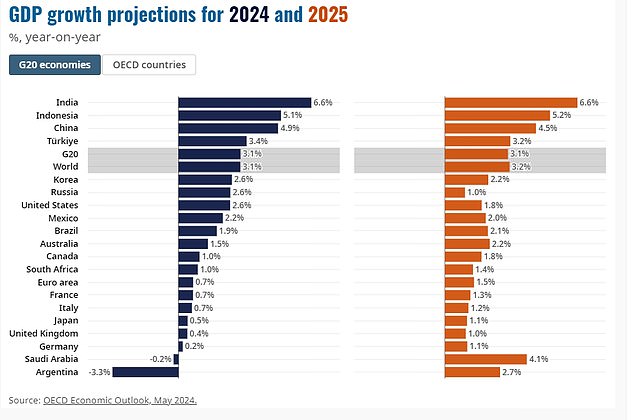- GDP growth expected to ‘remain sluggish’ at 0.4% in 2024
- The only G7 country that will perform worse is Germany
- However, the OECD predicts that UK rates will begin to be cut in the third quarter.
The UK will be among the slowest-growing G7 nations this year and next, according to the latest OECD forecasts.
GDP is expected to “remain sluggish” at 0.4 percent in 2024 before rising to 1 percent in 2025.
It is the slowest growth of all other G7 economies apart from Germany, which is expected to grow 0.2 percent this year and 1.1 percent in 2025.
The OECD said the UK’s GDP is expected to grow by just 0.4% in 2024 and 1% in 2025.
However, the OECD said momentum is improving with 0.1 percent growth in UK GDP in February, after a 0.3 percent rebound in January.
Retail sales and mortgage lending have begun to recover, although they have not yet reached pre-pandemic levels.
While inflation continues to fall, it is expected to remain stable at 3.3 percent in 2024, before falling to 2.5 percent in 2025, the OECD predicts.
The latest CPI reading was 3.2 percent, but economists warn it could remain at this level for some time, following in the footsteps of the United States.
The big question for authorities is when interest rates will begin to be cut. There is speculation that the Bank of England could start easing monetary policy as early as June, which will be a welcome relief for homeowners.
OECD predicts UK rate cut in Q3
However, the OECD said it predicts that rates will begin to be cut in the third quarter and that the central bank will gradually reduce the base rate from 5.25 percent to 3.75 percent by the end of 2025.
However, tax revenues “will continue to rise to reach record highs of around 37 per cent of GDP” as National Insurance cuts barely make a dent in the impact of frozen income tax thresholds.
Public spending is expected to be 2.9 percent of GDP higher by 2028/29 than before the pandemic.

Chancellor Jeremy Hunt said: ‘This forecast is not particularly surprising given that our priority over the last year has been tackling inflation with higher interest rates.
“But now that we are winning that war, growth matters, so it is significant that last month the IMF predicted that the UK will grow faster in the next six years than any European G7 country or Japan.
“To sustain this we must stick to our plan: competitive taxes, a flexible labor market and far-reaching welfare reform.”
Elsewhere, the United States is expected to grow its GDP by 2.6 percent in 2024 and 2.2 percent in 2025.
Global GDP is expected to grow 3.1 percent in 2024, the same growth as in 2023, followed by a slight rebound to 3.2 percent in 2025.
Elsewhere, global unemployment is approaching its lowest levels since 2001, while real incomes are rising as inflation begins to fall.
Headline inflation in the OECD is expected to fall from 5 percent in 2024 to 3.4 percent in 2025 as central bank action begins to be felt. It also predicts that by the end of next year, inflation will again reach central banks’ targets in most major economies.
The OECD has called on monetary policymakers to “remain cautious” to ensure inflation continues to decline, but said there is “room to reduce policy rates” as it falls.
Said OECD Secretary General Mathias Cormann. ‘Policy measures must guarantee macroeconomic stability and improve medium-term growth prospects.
“Monetary policy must remain prudent, with room to reduce policy rates as inflation declines, fiscal policy must address growing pressures on debt sustainability, and policy reforms must drive innovation, investment and opportunities in the labor market, particularly for women, young people and older workers.’
The debt burden is expected to increase if no action is taken and there is a need to improve the efficiency of public spending and optimize tax revenues, the OECD said.
“The foundations for future output and productivity growth must be strengthened through ambitious structural policy reforms to improve human capital and take advantage of technological advances,” said OECD Chief Economist Clare Lombardelli.


